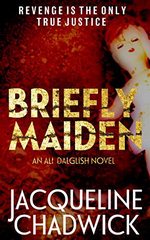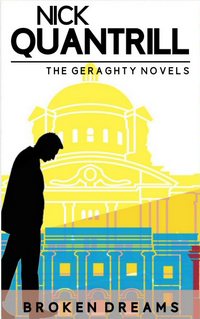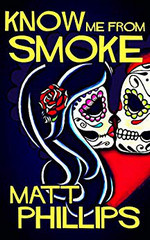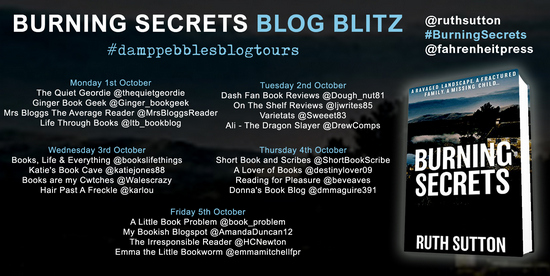by Jo Perry
Series: Charlie & Rose Investigate, #3Kindle Edition, 268 pg.
Fahrenheit Press, 2019
Read: February 15 – 18, 2019

I can’t explain how death works––I can’t explain cruelty or love––and I don’t know anything for certain except that I failed at life.
Well, I refuse to fuck up my death any more than I already have––
And whatever it means or requires––I won’t fail Rose.
And failing Rose actually seems to be something that can happen here — we’ve seen Charlie and Rose interact with other ghosts before, but not for long — somehow, this time there’s a ghost that they have prolonged — and repeated — interaction with. This other ghost has threatened Rose — despite seemingly being unable to do anything to her, the intent and tone of voice used, scares Rose. And the one thing that’s definitely changed about Charlie post-death is his commitment to this dog, his ability to care for her.
But before we meet this ghost — and see the gruesome, horrific way they become one — we see another killing. The killing of a protected tree. What’s worse, this tree is home to an Spotted Owl and her owlet. While the tree is being (illegally) removed from a plot of land, the owlet falls out and is injured. It was these events that brought Rose, and therefore Charlie, to this area. Coming to the defense of the tree and the owls is a very naked and tattooed woman. She brings in the authorities, and sets off a chain of events that I won’t try to summarize, because you wouldn’t believe me and Perry does a better job than I would in a sentence or two.
This woman, it turns out is named Eleanor Starfeather (really). She’s a doula (birth and death, which is a thing that I just learned exists) and a house sitter — among other things. The house she’s currently sitting belongs to Charlie’s brother and his wife. Charlie’s brother, we already know, is not anyone you want to know. Greedy, superficial, arrogant, vain and uncaring — and his wife is worse. The bulk of the book’s action revolves around these three as they deal with the fall-out from the removal of this tree, the removal of the owlet and the mother owl’s reaction to both being gone. But it also involved a development company — which is developing the land next to Charlie’s brother and a property where Charlie used to live — not that you can tell that anymore.
Charlie and Rose witness a murder near that second property and are pushed into trying to figure out who was behind that murder. Our ghostly pair are hovering around the areas of overlap between the Venn diagram describing these people, company and properties. And slowly, a full picture emerges allowing them to figure out who was behind the murder. Along the way, we (via Charlie and Rose) get to watch the fall-out — involving city politics, real estate development, lawyers, a vengeance-seeking bird, a séance, a mini-Cooper driving Scotsman, and a natural disaster — oh, yeah, and Charlie’s brother having several of the worst days of his life in a row.
This all primarily takes place, where else could it, in Beverly Hills. A place that Charlie clearly has strong opinions about:
Leave it to the City of Beverly Fucking Hills to have “Beverly Hills” engraved twice on its police badges just to emphasize that their black necktied, highly trained, buff, and attractive Beverly Fucking Hills peace officers protect and serve the plastic surgery-altered, chemically peeled, hairlines suture-tightened, Botox-injected, Viagra-aroused, personally trained, lifestyle-coached, professionally organized, blow-dried, sixteen-thousand-dollar blinged-out handbag cultists and their Orc boyfriends and husbands here in this omphalos of malignant narcissism, this authentic-human-emotion-sucking manicured vortex with its fluffy cashmere clouds scudding across the Tiffany-blue vacancy that hangs above the abomination known the world over as Beverly Fucking Hills.
Which adds a different feel to the book than we’ve had in the series. We’ve bounced around from place to place in this series, but I don’t knows that I’ve had such a strong sense location before (I’m not suggesting the earlier books were missing anything, but this has added something). We do spend some time in Charlie’s old neighborhood, but not that much.
It’s possible that Charlie refers to the city with the two words that most people use, but I think it’s always his special elongated form. Ditto for his older sibling, or as he seemingly always refers to him, “my shit brother.” Maybe one reason that Charlie and Rose are still hanging around is that Charlie still holds such determined thoughts and passionate feelings about things like his brother and this city.
In Dead is Good, we got to witness Charlie realize how much someone meant to him, in ways hadn’t really seen in life. In Dead is Beautiful, we get to witness Charlie smitten with a woman — of course, it’ll be unrequited (and would’ve likely been if he was flesh and blood, too), but he is fixated on Eleanor. It’s a side of him that’s nice to see. It’s also helpful for there to be people he actually likes involved with everything he’s witnessing, so he can be positive about some of what happens. By the end of the novel, Charlie does realize a few things about his brother and the way he thinks about him — I’m not sure there’s growth there, but there’s self-awareness, which is almost as good.
We also get a few more clues about the nature of the afterlife and how things work for the souls of the deceased (man or beast…at least dog), but no real answers. I’m okay with that, I don’t think I want answers, I like not getting this afterlife, as long as Charlie and Rose are figuring out what the living are up to.
Last week, when I reposted what I’d written about the first three books, I felt awkward about my frequent references to “funny.” When I think back on these books, I don’t think about funny — I think about the crimes, the victims, the reflections on society and death that these books focus on. But I felt vindicated reading this, because it’s a very funny book. There’s slapstick all over the place — even when the events depicted aren’t that funny, they’re told in a way that clearly tells the reader to smile and chuckle. Just that description of Beverly Hills above demonstrates the oft-comedic voice.
But it’s not all funny — there’s a reverence toward death, toward life, toward the relationship between people and dogs. The fate and well-being of the tree and owls are treated seriously and with care. The comedy comes in Charlie’s observations of and reactions to the events he witnesses. His first exposure to Alexa, for example, made me laugh out loud.
As Charlie (ever so gradually) evolves (Charlie of the first two books doesn’t treat the other ghost the way this Charlie does), as we spend more time in this world, Perry keeps improving — this is one of those series that improves as it goes on. These unique protagonists get us to look at life and events in a different kind of way, while reading very different kind of mysteries. I hope I get to keep spending time with them for a long time to come — and I strongly encourage you to join in the fun.
—–

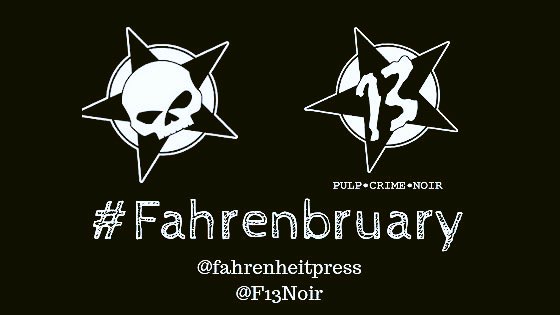
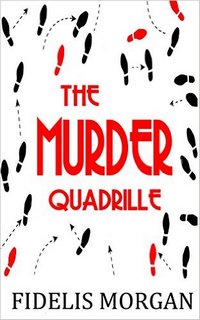 The Murder Quadrille
The Murder Quadrille






